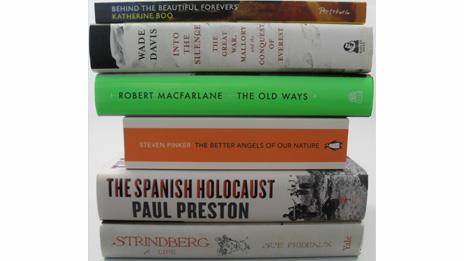Six vie for Samuel Johnson Prize
- Published

A biography of the playwright August Strindberg, and an exploration of a Mumbai slum are the focus of two books competing for the Samuel Johnson Prize.
The £20,000 prize, now in its 14th year, is awarded to a non-fiction book from a shortlist of six contenders.
This year's shortlist covers a wide range of subject matters, including the explorer George Mallory and a study of the Spanish civil war.
The winner will be announced on 12 November.
Like the shortlist, the winner is selected by panel of judges led by the Minister for Universities, David Willetts. Writer Patrick French, Guardian critic Paul Laity, Prospect magazine's Bronwen Maddox, and cultural critic Professor Raymond Tallis complete the panel.
'High quality'
First time novelist Katherine Boo's study of Mumbai's Annawadi slum, Behind The Beautiful Forevers, goes up against Sue Prideaux - and her latest biography Strindberg: A Life.
Prideaux is best known for her award-winning biography of Edvard Munch: Behind the Scream.
Paul Preston's The Spanish Holocaust marks "the first authoritative history of Spain's darkest period", while explorer Wade Davis puts Mallory's 1924 expedition to Everest into context, looking at the aftermath of World War I and a generation's capacity for endurance.
Two further books appear on the shortlist: Author Robert McFarlane's The Old Ways - retreading ancient footpaths and looking at "the profound ways in which we are shaped by the landscapes through which we move", and Steven Pinker's history of violence and humanity, The Better Angels Of Our Nature.
"The titles on this year's shortlist have all impressed the judges with their originality and high quality of writing," said Mr Willetts.
"Each of them communicates complex themes, and in a way that is both enlightening and entertaining."
Previous winners of the prize include Antony Beevor's Stalingrad, in the prize's inaugural year, and Jonathan Coe's Like a Fiery Elephant.
- Published6 July 2011
- Published14 June 2011